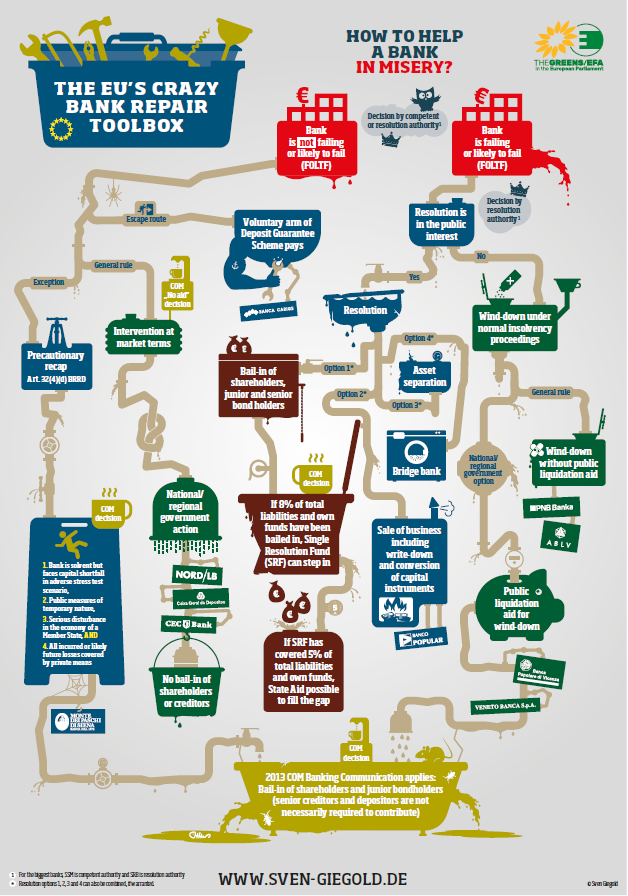Dear friends,
dear interested,
This chart is a must for everyone professional or interested in financial markets! When states in Europe rescue banks, there is no fixed template. Instead, there are countless ways to reach the questionable goal in the messy maze of European rules. In technical jargon, the various methods of bank rescue are often called “tools”. I think the European toolbox itself is in great need of repair! The full extent of the madness is shown in our infographic “The EU’s crazy bank repair toolbox” (also below).
It is easy to get lost in the crazy labyrinth of European bank aid rules. But, we have spared no effort in mapping all the routes, detours, bypasses and dead ends. After months of research, we figured out all possible ways that allow you to reach your goal: help a bank in misery without full private liability. Our map will be an indispensable tool for caring member states that are committed to protecting banks’ creditors and investors from the hardship of bail-ins.
Of course, it is easy to make fun of something as messy as the European “bank aid rules”. In recent years, rules designed to enforce private liability have developed into a veritable Swiss cheese of exceptions. But the consequences are not funny at all. In this hyper-complex framework, it is still far too often the taxpayers that pay for the bill in the end. We will likely see the next episode of this bitter recurring theme when the fallout from the COVID-19 pandemic will finally show up in the loan books of European banks.
Never again should European banks be bailed out with taxpayers’ money. Never again should states have to help banks in misery. That was the mantra following the great financial crisis. But the temptation is all too great: whether it be Monte dei Paschi, ABLV or NORD/LB – more than 10 years after the crisis, the EU states are still regularly rushing to the rescue of their banks. Even in times of economic stability, rescuing banks is still all the rage in Europe.
This is made possible by the complex European state aid rules for banks. For non-experts, the thicket of regulations is almost impenetrable. Even specialists quickly get lost in the jungle of paragraphs. But the good news for states with helper syndrome is that there is something for everyone. And our new graph leads the way!
Summer fun aside: the rules governing bank rescue in Europe must change. The new EU Commission is planning a reform of the EU bank rescue rules (“BRRD”). For us Greens it is clear: the many exceptions lead to unfair competition and burdens for the taxpayers. It is time for a consistent application of the principle of liability. Only then will risk finally be adequately priced in banks’ equity capital and equity-replacing financial instruments. Already today, authorities should be stricter in this regard: The Directorate General for Competition under Margrethe Vestager, the EU Directorate General for Financial Markets under Valdis Dombrovskis, Andrea Enria’s ECB banking supervision and the EU bank resolution mechanism under Elke König must apply fair competition more consistently and more rigorously in the interest of taxpayers. Exceptions must not become the rule. Even though we unfortunately do not have currently a majority for this in the European Parliament: We will continue to criticize these new bank subsidies in the future.
Service: After the summer break, everybody interested can pick up a personal poster copy in my Brussels office. This is a must-have for the work place of any financial expert! There are also still copies of the preceding graphic from 2014, which makes fun of the equally crazy decision-making structures in EU bank resolution:
https://sven-giegold.de/bankenrettung-leicht-gemacht/
With green European greetings,
Sven Giegold
P.S.: INVITATION to the online conference: “Structural racism: Italian and German perspectives in dialogue” on Tuesday 14 July 8 – 10 pm. Our next Italian-German webinar by #WeAreInThisTogether with great guests. Live interpretation in German and Italian. Join us and sign up: registration

